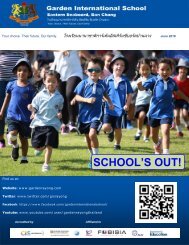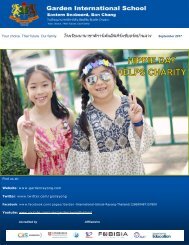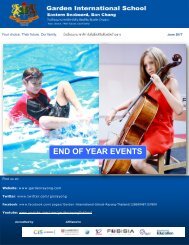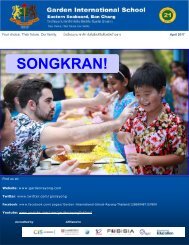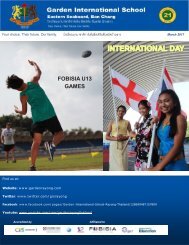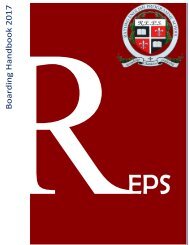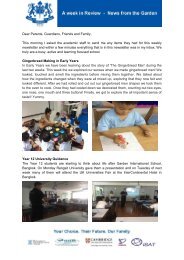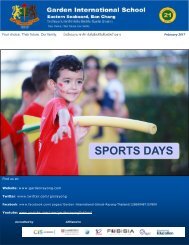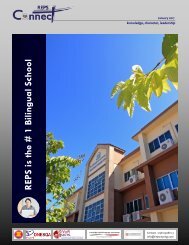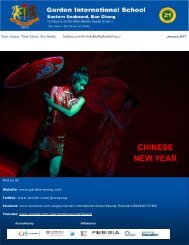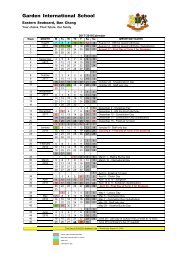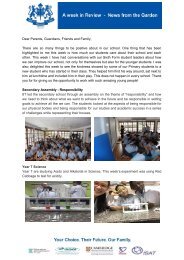GIS IB Handbook 2016-17
Create successful ePaper yourself
Turn your PDF publications into a flip-book with our unique Google optimized e-Paper software.
Garden International School,<br />
Eastern Seaboard,<br />
Ban Chang, Thailand<br />
A Guide to the<br />
International Baccalaureate<br />
Diploma Programme <strong>2016</strong>-<strong>17</strong><br />
Garden International School<br />
188/24 Moo 4, Pala-Ban Chang Road, Tambon Pala, Amphur Ban Chang, Rayong 21130, Thailand<br />
E-mail: enquiries@gardenrayong.com<br />
www.gardenrayong.com<br />
1
Contents<br />
Page 3 The <strong>IB</strong> Mission Statement<br />
Page 4 Why the <strong>IB</strong> Diploma? An Education for Life<br />
Page 5 History of <strong>IB</strong><br />
Page 6 Why <strong>IB</strong> at <strong>GIS</strong>?<br />
Page 7 How to enter <strong>IB</strong> / What are all the options?<br />
Page 8 Why <strong>GIS</strong> Students Love <strong>IB</strong><br />
Page 9-10 The Diploma Programme – in detail<br />
Page 11 <strong>IB</strong> Learner Profile<br />
Page 12 <strong>IB</strong> Diploma Subjects<br />
Page 13 <strong>IB</strong> Certificates<br />
Page 14 CAS – Creativity, Activity, Service<br />
Page 15-16 <strong>IB</strong> Extended Essay<br />
Page <strong>17</strong>--18 Theory of Knowledge<br />
Page 19 Group 1: Studies in Language and Literature: Language A<br />
Page 20 Group 2: Language Acquisition: Language B<br />
Page 21 Ab Initio<br />
Page 22 Group 3: Individuals and Society<br />
Page 23 Geography<br />
Page 23 Business & Management<br />
Page 24 Information Technology in a Global Society (ITGS)<br />
Page 25 Group 4: Sciences<br />
Page 26 Biology<br />
Page 27 Physics<br />
Page 28 Design Technology<br />
Page 29 Group 5: Mathematics HL & SL<br />
Page 30 Mathematical Studies SL<br />
Page 31 Group 6: The Arts, Business Management, History / Visual Arts<br />
Page 32 Music<br />
Page 33 History<br />
Page 34 Chemistry<br />
Page 35 <strong>GIS</strong> Subject Options<br />
Page 36 <strong>GIS</strong> <strong>IB</strong> Diploma examination results<br />
Page 37 Contact Us<br />
2
<strong>IB</strong> Mission Statement<br />
The International Baccalaureate Organisation<br />
aims to develop inquiring, knowledgeable and<br />
caring young people who help to create a better<br />
and more peaceful world through intercultural<br />
understanding and respect.<br />
The <strong>IB</strong> works with schools,<br />
governments and international organisations to<br />
develop challenging programmes of international<br />
education and rigorous assessment.<br />
These programmes encourage students across<br />
the world to become active, compassionate and<br />
lifelong learners who understand that other<br />
people, with their differences, can also be right.<br />
3
Why the <strong>IB</strong> Diploma? An Education for Life<br />
The International Baccalaureate Diploma Programme (<strong>IB</strong>DP) is the world’s<br />
leading pre-university course of study. At Garden International School, the <strong>IB</strong>DP<br />
begins in Year 12 after students have completed their IGCSE courses.<br />
The <strong>IB</strong> course finishes almost two years later in Term 3 of Year 13. For those<br />
students wishing to have a head start in their career, their choice of university<br />
worldwide or advanced placement at a Thai University, the <strong>IB</strong> Diploma is the<br />
only real option.<br />
<strong>GIS</strong> is the most experienced <strong>IB</strong> school in the region. For over 16 years <strong>GIS</strong> has<br />
been at the forefront of delivering the Diploma Programme, boasting an<br />
excellent coordinating team and enthusiastic, experienced staff whose high<br />
standards and practices reflect the demands of the Diploma. The ‘<strong>IB</strong>’, as it is<br />
known globally, is proud in its pursuit of lifelong learning, academic excellence,<br />
and the celebration of cultural diversity. By adopting these deals into its own<br />
mission statement, <strong>GIS</strong> is perfectly positioned to offer students a passport to<br />
success, via the <strong>IB</strong> Diploma.<br />
An important part of the <strong>IB</strong>DP is ‘CAS’. CAS stands for Creativity, Activity and<br />
Service and is an essential part of the Diploma programme. At <strong>GIS</strong>, <strong>IB</strong> students<br />
in Years 12 and 13 generally spend a minimum of two afternoons per week<br />
engaged in CAS activities. These activities range from teaching English at a<br />
local Thai school to learning new skills. CAS is often about helping others, and<br />
these ideals are mirrored by the caring, nurturing atmosphere which exists at<br />
<strong>GIS</strong>.<br />
4
History of <strong>IB</strong><br />
The International Baccalaureate Organisation (<strong>IB</strong>O), founded in 1968, is a nonprofit<br />
educational foundation based in Geneva, Switzerland. It offers three<br />
programmes:<br />
Diploma Programme (DP)<br />
Middle Years Programme (MYP)<br />
Primary Years Programme (PYP)<br />
<br />
<br />
<br />
<br />
There are more than 3,600 authorised <strong>IB</strong> schools.<br />
More than 1 million students take the <strong>IB</strong> examinations every year.<br />
The <strong>IB</strong> is available in 146 countries around the world.<br />
It is highly regarded by the world’s leading universities and employers.<br />
<strong>GIS</strong> offers the Diploma Programme for Years 12 (<strong>IB</strong>1) and 13 (<strong>IB</strong>2) students.<br />
5
Why <strong>IB</strong> at <strong>GIS</strong>?<br />
There are several strong reasons why Garden International School is the best place for<br />
your child to study for the <strong>IB</strong> Diploma.<br />
- Our teachers are highly experienced and most have been teaching <strong>IB</strong> Diploma subjects<br />
for many years. Several teachers are also official <strong>IB</strong> examiners.<br />
- <strong>GIS</strong> is based in Ban Chang, which offers a safe, secure, semi-rural environment for your<br />
child. We offer full or weekly boarding.<br />
- We have an excellent track record. In <strong>2016</strong> we had a 100 per cent pass rate and our<br />
points’ average was far higher than the global average. In recent years, <strong>GIS</strong> students<br />
have gone on to study at world-famous institutions such as UCLA and Berklee College of<br />
Music in the US and the University of Warwick and Durham University in the UK.<br />
- We have been a member of the International Baccalaureate Organisation since in 1998,<br />
longer than any other international school in the region.<br />
- Our <strong>IB</strong> numbers continue to grow, but we are still able to offer a low teacher-student ratio.<br />
These small class sizes mean teachers can offer extensive support and help to students.<br />
- We have excellent facilities, including fully-equipped laboratories, new ICT suites, highquality<br />
musical sound rooms and 3D printers for our well-equipped DT classrooms.<br />
- <strong>GIS</strong> offers significant extra support for students. This includes a specialist University<br />
Counsellor, trips to university exhibitions and special workshops. The workshops help<br />
students know how to apply to universities, give advice about living independently and<br />
also show students how to write an impressive CV.<br />
- Our Prefect programme offers <strong>IB</strong> students the chance to take on significant leadership<br />
roles within school. This experience is also extremely useful and influential when<br />
applying to universities.<br />
6
How to enter <strong>IB</strong><br />
To enter <strong>IB</strong>, students need to have 5 or more IGCSEs (grade A*-C). This must<br />
include at least a C at IGCSE ESL.<br />
After the IGCSEs – What Are All The Options?<br />
1) Study for the <strong>IB</strong> Diploma – students who have the <strong>IB</strong> Diploma have a<br />
much greater choice about where to go to university. Our <strong>IB</strong> graduates<br />
have gone on to study in the UK, USA, Australia, Hong Kong, Singapore,<br />
India, and many other countries.<br />
2) In <strong>2016</strong>, the Thai government announced that students with only IGCSEs<br />
could not join Thai universities. This is because the level of study is not<br />
high enough. Therefore, a pre-university course such as <strong>IB</strong> is ideal as it is<br />
academically more challenging than IGCSE and also better prepares<br />
students for university life.<br />
7
Why <strong>GIS</strong> Students Love <strong>IB</strong><br />
“<strong>IB</strong> is a really challenging course that combines, with the correct<br />
balance, the required hard work, relaxation and fun. <strong>IB</strong> really taught<br />
me to be more independent and open-minded.<br />
Yes, I had a lot of sleepless nights but I still think that <strong>IB</strong> was the best<br />
time of my life in school. <strong>IB</strong> is a really enterprising and rewarding<br />
course that one should not miss, if given the chance.”<br />
Rohit Ghosh (India) – <strong>IB</strong> Diploma Graduate<br />
'<strong>IB</strong> makes you more knowledgeable, more confident and more<br />
organised. You'll need to study hard but you will be supported by<br />
great teachers and other students. It's a lot of work and also a lot of<br />
fun. <strong>IB</strong> is a challenge - but the rewards are huge.'<br />
Sarah Chi (Korea) – <strong>IB</strong> Diploma Graduate<br />
“<strong>IB</strong> produces students who are unique, organised and have a great sense<br />
of humour. It is one of the greatest opportunities in education; I found<br />
the <strong>IB</strong> experience to be fantastic.”<br />
Sunee Chaemprem (Nan) (Thailand) - <strong>IB</strong> Diploma Graduate<br />
“<strong>IB</strong> is a tough course, but studying at <strong>GIS</strong> really<br />
made a big difference as the experienced,<br />
approachable teachers meant there was always<br />
help and support available.”<br />
Hui Eun (Korea) - highest-ever <strong>IB</strong> points<br />
total by a female student at <strong>GIS</strong>.<br />
“<strong>GIS</strong> is an awesome, friendly school with both<br />
knowledgeable and experienced teachers who have<br />
sufficient time to learn each individual student's<br />
profile and thus help them develop both<br />
academically and as a person.”<br />
Lucas Akesson (Sweden) <strong>IB</strong> Diploma graduate<br />
8
The Diploma Programme – in detail<br />
The International Baccalaureate Organisation’s (<strong>IB</strong>O) Diploma Programme is a<br />
demanding pre-university course of study that leads to examinations in the final<br />
year of school. It is designed for highly-motivated secondary school students<br />
aged 16 to 19.<br />
The programme has earned a reputation for rigorous assessment, giving <strong>IB</strong><br />
Diploma holders access to the world’s leading universities. The <strong>IB</strong>O has shown,<br />
over more than 40 years, that graduate <strong>IB</strong> students are extremely well prepared<br />
for university study.<br />
Recent decisions by the Thai Government have recognised the <strong>IB</strong> Diploma as<br />
appropriate for advanced placement in Thai universities. This gives Thai<br />
students the best of both worlds. With the Diploma, they have their choice of<br />
universities abroad or they can stay at home and enjoy the dividends of their<br />
excellence with advanced placement.<br />
Candidates may study towards the award of either International Baccalaureate<br />
Subject Certificates or towards the full International Baccalaureate Diploma.<br />
The Diploma Programme Curriculum<br />
The programme has the strengths of a traditional and broad curriculum, but with<br />
three important additional features, shown at the centre of the circular<br />
curriculum model.<br />
9
SUBJECT CHOICES<br />
Students choose six subjects from the six academic areas around the circular<br />
curriculum model. Students are required to study Humanities, Mathematics and<br />
Science subjects, as well as a second language.<br />
There are three other features to <strong>IB</strong> that make it unique and highly respected:<br />
Creativity, Activity, Service (CAS)<br />
The <strong>IB</strong>O’s goal is to educate the whole person and develop compassionate<br />
citizens. The CAS programme encourages students to share their energy and<br />
special talents with others: students may, for example, participate in theatre or<br />
musical productions, sports and community service activities.<br />
Students should develop greater awareness of themselves, concern for others,<br />
and the ability to work with people in their community. See P13 for more.<br />
Theory of Knowledge (TOK)<br />
Theory of Knowledge is intended to stimulate critical reflection on the knowledge<br />
and experience gained inside and outside the classroom. The course challenges<br />
students to question the bases of knowledge, to be aware of subjective and<br />
ideological biases and to develop the ability to analyse evidence that is<br />
expressed in rational argument. It is a key element in encouraging students to<br />
appreciate other cultural perspectives. The course is unique to the <strong>IB</strong>O, which<br />
recommends at least 100 hours of teaching time.<br />
Extended Essay (4,000 words)<br />
Each student has the opportunity to investigate a topic of special interest. The<br />
Extended Essay requirement acquaints Diploma candidates with the kind of<br />
independent research and writing skills expected by universities. The <strong>IB</strong><br />
recommends that a student devote a total of about 40 hours of private study and<br />
writing time to the essay, which may be written in one of 60 subjects, including<br />
many languages. The essay allows students to deepen their programmes of<br />
study, for example, by selecting a topic in one of their higher level (HL) courses.<br />
10
The <strong>IB</strong> Learner Profile<br />
The aim of all <strong>IB</strong> programmes is to develop internationally-minded people who<br />
help to create a better and more peaceful world. <strong>IB</strong> learners strive to be:<br />
Inquirers<br />
We nurture our curiosity, developing skills for inquiry and research. We know<br />
how to learn independently and with others. We learn with enthusiasm and<br />
sustain our love of learning throughout life.<br />
Knowledgeable<br />
We develop and use conceptual understanding, exploring knowledge across a<br />
range of disciplines. We engage with issues and ideas that have local and<br />
global significance.<br />
Thinkers<br />
We use critical and creative thinking skills to analyse and take responsible<br />
action on complex problems. We exercise initiative in making reasoned, ethical<br />
decisions.<br />
Communicators<br />
We express ourselves confidently and creatively in more than one language and in<br />
many ways. We collaborate effectively, listening carefully to the perspectives of others.<br />
Principled<br />
We act with integrity and honesty, with a strong sense of fairness and justice, and with<br />
respect for the dignity and rights of people everywhere. We take responsibility for our<br />
actions and their consequences.<br />
Open-minded<br />
We critically appreciate our own cultures and personal histories, as well as the<br />
values and traditions of others. We seek and evaluate a range of points of view,<br />
and we are willing to grow from the experience.<br />
Caring<br />
We show empathy, compassion and respect. We have a commitment to service,<br />
and we act to make a positive difference in the lives of others.<br />
Risk-takers<br />
We approach uncertainty with forethought and determination; we work<br />
independently and cooperatively to explore new ideas and innovative strategies.<br />
We are resourceful and resilient in the face of challenges and change.<br />
Balanced<br />
We understand the importance of balancing different aspects of our lives -<br />
intellectual, physical and emotional - to achieve well-being for ourselves and<br />
others.<br />
Reflective<br />
11
We thoughtfully consider the world and our own ideas and experience. We work<br />
to understand our strengths and weaknesses in order to support our learning<br />
and personal development.<br />
<strong>IB</strong> DIPLOMA SUBJECTS:<br />
Group 1 (Studies in Language and Literature)<br />
English A: Language and Literature<br />
Thai A: Language and Literature<br />
Self taught Language A – e.g. Korean, Hindi, Russian, French<br />
Group 2 (Language Acquisition)<br />
English B<br />
Spanish B, Mandarin B<br />
Spanish Ab Initio<br />
Group 3 (Individuals and Societies)<br />
Geography<br />
ITGS (Information Technology in a Global Society)<br />
Business Management<br />
Group 4 (Sciences)<br />
Biology<br />
Physics<br />
Design Technology<br />
Group 5 (Mathematics)<br />
Mathematics HL<br />
Mathematics SL<br />
Mathematical Studies SL<br />
Group 6 (Arts)<br />
Visual Arts<br />
Music<br />
Chemistry<br />
History<br />
Candidates study six selected subjects, one from each group. The Higher Level<br />
programmes are taught over 240 teaching hours and the Standard Level are<br />
taught over 150 hours.<br />
The Diploma requires three subjects to be taken at Higher Level (HL) and three<br />
at Standard level (SL).<br />
Each examined subject is graded on a scale of 1 (minimum) to 7 (maximum).<br />
To gain the Diploma, students need 24 points or more.<br />
Students must also successfully complete the Extended Essay, Theory of<br />
Knowledge course and participate in Creativity, Activity, Service (CAS) The<br />
maximum points that can be awarded is 45: 7 per subject plus a maximum of 3<br />
bonus points for the Extended Essay and Theory of Knowledge components.<br />
12
International Baccalaureate Subject Certificates<br />
Candidates who do not choose the full <strong>IB</strong> Diploma may study selected subjects<br />
at either Standard or Higher Levels, for which individual subject certificates are<br />
awarded. Certificates are not available for the Extended Essay, Theory of<br />
Knowledge or Creativity Activity and Service (CAS) components. All <strong>IB</strong> students<br />
at <strong>GIS</strong> are, however, required to complete a CAS programme. <strong>IB</strong> courses<br />
students do not have to write an Extended Essay or study TOK.<br />
University Entrance<br />
Listed below are some typical minimum <strong>IB</strong> Diploma point scores required by<br />
universities for acceptance onto degree courses. These are guidelines and<br />
entrance requirements will vary. Specific information is available in university<br />
prospectuses.<br />
UNIVERSITY<br />
DEGREE<br />
<strong>IB</strong> Diploma Point<br />
Scores<br />
UNIVERSITY<br />
DEGREE<br />
<strong>IB</strong> Diploma Point<br />
Scores<br />
Architecture 34 Physiotherapy 30<br />
Archaeology 30 Geography 31<br />
Visual Arts 28 English 30<br />
Biology 30<br />
Modern<br />
Languages<br />
Chemistry 30 Geology 30<br />
History 30 Music 30<br />
Physics 30 Economics 33<br />
Engineering 33 Politics 30<br />
Electronics 33 Sociology 28<br />
Law 34 Mathematics 30<br />
Medicine 38 Business<br />
30<br />
33<br />
Some UK universities lowered their entry requirements for <strong>IB</strong> in 2013<br />
because they value <strong>IB</strong> so highly.<br />
13
Creativity, Activity, Service (CAS)<br />
‘CAS’ is a fundamental part of the <strong>IB</strong> Diploma<br />
programme and is central to the whole<br />
philosophy of Garden International School.<br />
The emphasis of CAS is on learning through<br />
experience. Diploma students are expected to<br />
be involved for the equivalent of at least two to<br />
three hours a week over two years in a<br />
balanced range of activities.<br />
<br />
<br />
<br />
CREATIVITY – covers a wide range of arts and activities.<br />
ACTIVITY – includes participation in expeditions, individual and team<br />
sports and physical training.<br />
SERVICE – includes community and social service, environmental and<br />
international issues.<br />
The aims are to provide challenges in each area, develop skills and interests<br />
and to provide opportunities for service. Activities are designed to complement<br />
academic disciplines and develop a ‘spirit of discovery, self-reliance and<br />
responsibility’.<br />
Assessment<br />
Diploma students complete a selfevaluation<br />
after each activity module.<br />
Target setting and reflection are a<br />
major part of CAS.<br />
<strong>IB</strong> students maintain an online CAS<br />
diary for recording activities, projects<br />
and evaluations. Students complete<br />
a course evaluation at the end of<br />
Years 12 and 13.<br />
Major Community Projects<br />
Year 12 and 13 CAS students at<br />
<strong>GIS</strong> work on major projects, which<br />
may include assisting at the<br />
Camillian Social Centre Rayong and<br />
teaching English at Pala Temple<br />
School. They may also lead and<br />
organise events in school, such as<br />
talent shows or fundraisers.<br />
14
The Extended Essay<br />
The Extended Essay is an integral part of the International Baccalaureate Diploma<br />
programme. The essay is a 4,000-word personal research project, which aims to<br />
offer students the opportunity to investigate a topic of special interest and<br />
acquaints students with the independent research and writing skills expected at<br />
university.<br />
For a diploma to be awarded, all the following regulations must be complied with:<br />
Regulation 1 – The Requirement<br />
Every <strong>IB</strong> Diploma candidate must submit an Extended Essay. Extended Essays<br />
may only be submitted by candidates in the Diploma and re-take categories.<br />
Regulation 2 – Supervision<br />
It is the school’s responsibility to ensure that each candidate submitting an<br />
Extended Essay is supervised by a teacher with appropriate qualifications and/or<br />
experience in the subject chosen by the candidate. The teacher providing this<br />
supervision is known as the candidate’s Extended Essay supervisor.<br />
Regulation 3 - Language of the Essay<br />
Extended Essays submitted in a Group 1 or Group 2 language must be written in<br />
that language. Extended essays in all other subjects must be written in English,<br />
French or Spanish.<br />
Regulation 4 – Academic Honesty<br />
Academic Honesty means making sure students do not try and gain an unfair<br />
advantage in any assessment through collusion or plagiarism. Collusion is when a<br />
candidate knowingly allows his or her work to be submitted for assessment by<br />
another candidate. Plagiarism is the submission for assessment of the<br />
unacknowledged work, thoughts or ideas of another person as the candidate’s<br />
own. To avoid charges of plagiarism, candidates must always ensure that they<br />
acknowledge fully and in detail the words and/or ideas of another person.<br />
The Nature of the Extended Essay<br />
The Extended Essay is an in-depth study of a limited topic, within a subject.<br />
Emphasis is placed on the process of engaging in personal research, on the<br />
communication of ideas and information in a logical and coherent manner, and on<br />
the overall presentation of the Extended Essay.<br />
The Choice of Subject<br />
It is best to choose the subject for the Extended Essay before deciding what the<br />
topic or research question will be. Certain topics may not be appropriate. The<br />
subject chosen is one of the Higher Level subjects being studied.<br />
Assessment of Extended Essays<br />
Use of Assessment Criteria<br />
All Extended Essays are externally assessed by <strong>IB</strong> examiners. Criterion levels will<br />
be awarded to each Extended Essay using a best match model. For each criterion,<br />
examiners are instructed to identify the level descriptor that is most appropriate for<br />
the Extended Essay under consideration.<br />
15
Award of Diploma Points<br />
The Extended Essay contributes to the overall Diploma score through the award<br />
of points in conjunction with Theory of Knowledge. A maximum of three points<br />
are awarded according to a candidate’s combined performance in both the<br />
Extended Essay and Theory of Knowledge.<br />
The total number of points awarded is determined by the combination of the<br />
performance levels achieved, based on this matrix:<br />
Diploma Points’ Matrix for the Extended Essay and<br />
Theory of Knowledge<br />
Theory of Knowledge<br />
Excellent<br />
(A)<br />
Good<br />
(B)<br />
Satisfactory<br />
(C)<br />
Mediocre<br />
(D)<br />
Elementary<br />
(E)<br />
Not<br />
Submitted<br />
Excellent (A) 3 3 2 2 F F<br />
Extended Essay<br />
Good (B) 3 2 2 1 F F<br />
Satisfactory<br />
(C)<br />
2 2 1 0 F F<br />
Mediocre (D) 2 1 0 0 F F<br />
Elementary (E) F F F F F F<br />
Not Submitted F F F F F F<br />
F = Failing Condition: students who obtain an ‘E’ for their TOK and/or Extended<br />
Essay will not be awarded the <strong>IB</strong> Diploma.<br />
16
THEORY OF KNOWLEDGE<br />
Nature of the Subject<br />
The Theory of Knowledge (TOK) programme is central to the educational<br />
philosophy of the International Baccalaureate. It challenges students to reflect<br />
critically on diverse ways of knowing and areas of knowledge, and to consider the<br />
role which knowledge plays in a global society.<br />
It encourages students to become aware of themselves as thinkers, to become<br />
aware of the complexity of knowledge, and to recognise the need to act<br />
responsibly in an increasingly connected world.<br />
The TOK Programme is composed almost entirely of questions. The most central<br />
of these is ‘How do I, or how do we, know that a given assertion is true, or a given<br />
judgement is well grounded?’ The programme entails the application of this<br />
central question to many different, yet interrelated topics.<br />
The TOK Diagram<br />
The following is a useful representation of the TOK Programme.<br />
<strong>17</strong>
Assessment Outline<br />
The assessment model in TOK comprises two components.<br />
Part 1: External Assessment (40 Points)<br />
Essay on a Prescribed Title (1,200 – 1,600 words). One essay on a title chosen<br />
from a list of ten titles prescribed by the <strong>IB</strong>O for each examination session.<br />
Examples of titles from a previous session are:<br />
‘Art upsets, science reassures’ (Braque). Analyse and evaluate this claim.<br />
‘Tell a man that there are 300 billion stars in the universe and he’ll believe<br />
you. Tell him a bench has wet paint on it and he’ll have to touch to be sure’<br />
(Anon). What does this suggest about the way different types of knowledge<br />
are justified?<br />
Must all ‘good explanations’ allow for precise predictions?<br />
In what ways might ‘emotional intelligence’ help or hinder the pursuit of<br />
knowledge?<br />
Part 2: Internal Assessment (20 Points)<br />
The Presentation (approximately 10 minutes per candidate). Each student makes<br />
a presentation to the class. There is also a written self-evaluation report, including:<br />
A concise description of the presentation<br />
Answers to the questions provided on the form.<br />
Examples of Presentation Topics:<br />
Art and its Audience<br />
Real life situation: Joshua Bell busking in New York City<br />
Knowledge issue: What shapes the way we appreciate and understand art?<br />
Sourcing our Food<br />
Real life situation: Monsanto and genetically engineered food<br />
Knowledge issue: How far can we determine who should decide on the part<br />
played by the natural sciences in our lives?<br />
18
The following gives more detail about each of the subjects offered at<br />
<strong>GIS</strong>.<br />
Group 1: STUDIES IN LANGUAGE AND LITERATURE:<br />
LANGUAGE A (Literature / Language and Literature)<br />
Every Diploma candidate is required to study a Group 1 language at Higher<br />
Level (HL) or Standard Level (SL). Self-taught candidates can only study<br />
Language A: Literature at SL.<br />
For the majority of candidates, language A will be their best language, in that they<br />
are expected to have native or near-native command of the language. It is,<br />
therefore, the candidate’s primary means of communication.<br />
English A (Language and Literature) and Thai A (Language and Literature) are<br />
offered at <strong>GIS</strong> at both SL and HL.<br />
The Language A programme aims to promote an appreciation of the wealth and<br />
subtleties of language and also lead to an awareness of linguistic structures. It<br />
encourages the development of an appreciation of language and literature and<br />
knowledge of other cultures and societies.<br />
In the Language part of the course, students study how meaning is created by<br />
looking at real-life texts, including newspapers, advertisements and political<br />
propaganda. In Literature, students study a range of classic and modern plays,<br />
poems and novels.<br />
Where no teacher is available in a student’s first language, provision is made by<br />
the International Baccalaureate organisation for students to study language A as a<br />
school supported self-taught course at Standard Level (SL).<br />
At Higher Level, the students will cover six literary works. At Standard Level they<br />
will cover four literary works. Both HL and SL students will also study a wide range<br />
of non-literary texts.<br />
The Syllabus<br />
The Standard Level (SL) and Higher Level (HL) programme is divided into four<br />
parts:<br />
<br />
<br />
<br />
<br />
Part 1: Language in Cultural Context<br />
Texts are chosen from a wide variety of sources, genres and media.<br />
Part 2: Language and Mass Communication<br />
Texts are chosen from a wide variety of sources, genres and media.<br />
Part 3: Literature: Texts and Contexts<br />
Total number of works: 2 (SL), 3 (HL)<br />
Part 4: Literature: Critical Study<br />
Total number of works: 2 (SL), 3 (HL)<br />
19
Group 2:<br />
LANGUAGE ACQUSITION:<br />
LANGUAGE B / LANGUAGE AB INITIO<br />
This group involves the study of a second foreign language. There are four<br />
language choices in Group 2. There is some flexibility as to the languages offered<br />
each year in Group 2, as it will depend upon each intake.<br />
Language B<br />
The Language B programme is offered in English, Spanish and Mandarin.<br />
Nature of the Subject<br />
Every diploma student is required to study a Group 2 language at either Higher<br />
Level (HL) or Standard Level (SL).<br />
Language B is a foreign language learning course designed for students with<br />
some previous experience of the language (a grade ‘C’ or above at IGCSE is<br />
preferred).<br />
The course aim is to provide students with a comprehensive understanding of the<br />
language whilst enabling them to develop a high proficiency in applying it to a<br />
variety of communicative contexts.<br />
Students will develop their skills in the language through exploring its social,<br />
academic and cultural elements. This will be achieved by studying a wide variety<br />
of texts, by learning to write in a wide variety of styles and by communicating<br />
effectively to many different audiences.<br />
Syllabus Outline<br />
The main focus of the course is on language acquisition and the development of<br />
the four primary language skills.<br />
Competence in each of the primary skills will involve an understanding of three<br />
inter-related areas:<br />
Language; handling the language system accurately<br />
Cultural Interaction; selecting language appropriate to a particular cultural<br />
<br />
and social context<br />
Message; understanding ideas and how they are organised in order to<br />
communicate them appropriately.<br />
The successful Language B candidate will demonstrate competence in the control<br />
of language, an appreciation of language appropriateness and an understanding<br />
of how meaning is best communicated.<br />
Assessment<br />
Assessment is based upon:<br />
Internal assessment (30%)<br />
Individual Oral Examination – 20%<br />
Interactive Oral Activity – 10%<br />
External assessment (70%)<br />
Paper 1 – Receptive Skills – 25%<br />
Paper 2 – Written Productive skills – 25%<br />
Written Assignment – 20%<br />
20
Language Ab Initio<br />
Ab Initio language is offered in Spanish.<br />
The Ab Initio programme is a foreign language programme to be studied over 2<br />
years at Standard Level by students who have little or no previous experience of<br />
learning the target language.<br />
This programme is appropriate for students interested in learning a new, foreign<br />
language as part of their <strong>IB</strong> Course. When choosing whether to study at Ab Initio<br />
level, <strong>IB</strong> says: “The most important consideration is that the language ab initio<br />
course should be a challenging, educational experience for the student.”<br />
In two years the candidates will achieve a standard approximating that of IGCSE,<br />
although with greater communication skills on a broader range of topics.<br />
As with Language B, the language skills of listening, reading, writing and speaking<br />
are equally weighted on the Ab Initio programme and in assessment.<br />
Oral assessment by coursework will take place in the final year of studies at the<br />
end of which there is also an individual oral examination.<br />
21
GROUP 3: INDIVIDUALS AND SOCIETIES<br />
This group offers subjects spanning the Humanities and Social Sciences. Garden<br />
International School offers Geography, History, Business and Management and<br />
Information Technology in a Global Society (ITGS).<br />
GEOGRAPHY<br />
Nature of the Subject<br />
Geography is a dynamic subject that is firmly grounded in the real world and therefore<br />
focuses on the interactions between individuals, societies and the physical environment in<br />
both time and space. It seeks to identify trends and patterns in these interactions and<br />
investigates the way people adapt and respond to change. The diploma programme<br />
Geography course integrates both physical and human Geography.<br />
Students can choose to study Geography at two levels: Higher level (HL) or Standard<br />
level (SL). The course is based around a core theme and geographical skills. HL<br />
students study 3 optional themes and SL students study 2 optional themes based on the<br />
human, physical and economic global environment. The course offers a wide range of<br />
subject matter and fosters a sound understanding of dynamic global systems.<br />
The Course will prepare the student for a broad range of career paths and/or higher<br />
education choices. Geography links well with Biology, Information Technology in a<br />
Global Society and Chemistry.<br />
Students choosing this course need a basic grounding in Geography, preferably a B<br />
grade at IGCSE or equivalent, and should have sound English and Mathematical skills.<br />
The Syllabus<br />
Part 1 - Core Theme (SL and HL):<br />
Populations in transition<br />
Disparities in wealth and development<br />
Patterns in environmental quality and sustainability<br />
Patterns in recourse consumption<br />
Part 2 - Optional themes: (Two for SL, 3 for HL)<br />
Fresh water – Issues and conflicts<br />
Oceans and their coastal margins<br />
Extreme environments<br />
Hazards and disasters<br />
Leisure, sport and tourism<br />
The geography of food and health<br />
Urban environments<br />
Part 3 – Extension: Global interactions (HL only)<br />
Measuring global interactions<br />
Changing space – shrinking world<br />
Economic interactions and flows<br />
Environmental change<br />
Socio-cultural exchanges<br />
Political outcomes<br />
Global interactions at a local level<br />
22
BUSINESS MANAGEMENT<br />
Nature of the Subject<br />
Business Management is the rigorous and critical study of the ways in which<br />
individuals and groups interact in a dynamic business environment. It is an<br />
academic discipline that examines how business decisions are made and how<br />
these decisions impact on internal and external environments. The ideals of<br />
international cooperation and responsible citizenship are at the heart of business<br />
and management.<br />
The <strong>IB</strong> Business Management course is designed to give students an<br />
understanding of business principles, practice and skills. Emphasis is placed on<br />
understanding technical innovation and day-to-day business functions of<br />
marketing, human resource management and finance. However, a fundamental<br />
feature of the programme is the concept of synergy. This is a concept that means<br />
an organisation should seek an overall return greater than the sum of its parts.<br />
The Course<br />
The syllabus for both SL and HL consists of five compulsory units and internally<br />
assessed coursework.<br />
Units: 1. Business organisation and environment<br />
2. Human resource management<br />
3. Finance and accounts<br />
4. Marketing<br />
5. Operations management<br />
Written Commentary (coursework for SL)<br />
A Written Assignment based on the application of tools, techniques and theory to<br />
a real business situation or problem.<br />
Written Commentary (coursework for SL) or Research Project (coursework<br />
for HL)<br />
A Written Assignment based on the application of tools, techniques and theory to<br />
a real business situation or problem.<br />
Assessment<br />
External Assessment 75%<br />
Written Papers 3 hours (SL) 4½ hours (HL)<br />
Paper 1: 1 hour 15 minutes 30% (SL), 2 hours 15 minutes 35% (HL)<br />
Questions are based on a case study issued in advance by the <strong>IB</strong>.<br />
Paper 2: 1 hour 45 minutes 45% (SL), 2 hours 15 minutes 40% (HL)<br />
Three (SL) or Four (HL) questions in total are answered from 3 sections – A, B<br />
and C.<br />
Internal Assessment (Written Commentary (SL) or Research Project (HL)) - 25%<br />
A Written Commentary of no more than 1,500 words. This must be based on three<br />
to five supporting documents about a real issue or problem facing a business<br />
organisation. For HL, a research project of up to 2,000 words is the coursework<br />
requirement. The project must address an issue facing an organisation or analyse<br />
a decision to be made by the organisation.<br />
23
INFORMATION TECHNOLOGY IN A GLOBAL SOCIETY (ITGS)<br />
Nature of the Subject<br />
The <strong>IB</strong> Diploma Programme Information Technology in a Global Society (ITGS)<br />
course is the study and evaluation of the impacts of Information Technology (IT)<br />
on individuals and society. It explores the advantages and disadvantages of the<br />
access and use of digitised information at the local and global level. ITGS<br />
provides a framework for the student so make informed judgments and decisions<br />
about the use of IT within social contexts.<br />
Although ITGS shares methods of critical investigation and analysis with other<br />
social sciences, it also considers social and ethical considerations that are<br />
common to other subjects in group 3. Students come into contact with IT on a<br />
daily basis because it is so pervasive in the world in which we live. This<br />
increasingly widespread use of IT inevitably raises important questions with<br />
regard to the social and ethical considerations that shape our society today. ITGS<br />
offers an opportunity for a systematic study of these considerations, whose range<br />
is such that they fall outside the scope of any other single discipline.<br />
The Course<br />
At either level (SL or HL) the ITGS course consists of three compulsory<br />
interconnected strands that reflect the integrated nature of the course.<br />
• Strand 1: Social and ethical significance<br />
• Strand 2: Application to specified scenarios<br />
• Strand 3: IT systems<br />
The HL course in ITGS differs from the SL course in ITGS as follows. HL students<br />
study the following as part of the HL extension, which consists of two additional<br />
topics in the IT systems strand:<br />
• IT systems in organisations<br />
• Robotics, artificial intelligence and expert systems.<br />
The HL course has an additional externally-assessed component that comprises a<br />
pre-seen case study based on a fictitious organisation; this allows students to<br />
research various aspects of the subject, which may include new technical<br />
concepts and additional subject content in greater depth.<br />
Assessment<br />
External assessment<br />
Paper 1 – structured questions that reflect the strands of the course<br />
Paper 2 – writing a response to an unseen article<br />
Paper 3 (HL only) – one question based on a pre-seen case<br />
Internal assessment<br />
This component is internally assessed by the teacher and externally moderated<br />
by the <strong>IB</strong> at the end of the course. Students will develop an original IT product for<br />
a specified client.<br />
24
GROUP 4: SCIENCES<br />
Garden International School offers four science subjects: Biology, Chemistry,<br />
Physics and Design Technology. One of the most difficult choices students will<br />
have is which science to choose and which level to study (Higher or Standard).<br />
Students have to choose at least one Science subject and should have a “C”<br />
grade at IGCSE Coordinated Science (or equivalent) in the science subject they<br />
wish to choose. If students are studying at Higher Level, they should have a<br />
minimum grade of B at IGCSE. For someone wishing to choose just one science<br />
subject, Biology at Standard Level (SL) would probably be more advisable than<br />
either Chemistry or Physics due to the analytical and mathematical content of<br />
these two subjects.<br />
At the other extreme, for students considering a career in science, or wanting to<br />
go to university to study medicine, dentistry, pharmacy or veterinary science, or<br />
enrol in engineering, the choice of more than one science subject is available. The<br />
great thing about the <strong>IB</strong> programme is its flexibility and ability to leave open many<br />
career pathways. If students are keen on following a career in science, please ask<br />
the <strong>IB</strong> Coordinator for more advice and guidance before making a definite choice<br />
of science subjects at <strong>GIS</strong>.<br />
The science subjects at <strong>IB</strong> differ from Coordinated or Combined science at IGCSE.<br />
The practical work is less guided and more like focused research, and is<br />
assessed and maintained in each student’s portfolio of work, which comprises the<br />
Internal Assessment component of 20% for Biology, Chemistry and Physics.<br />
A greater number of shorter practicals are completed for Biology and Chemistry,<br />
and cover every part of the course content. Fieldwork is essential for Biology and<br />
there are also some useful local visits to enrich the Chemistry course. Otherwise,<br />
the assessment of the sciences is made across common skills, such as design,<br />
data collection and processing and evaluation of experimental results, along<br />
with manipulative skills.<br />
A good IGCSE science student will find familiarity in the practical work and in the<br />
theory that goes with it. At Higher Level, a greater number of sub-topics are<br />
studied to a much greater depth, some with less everyday applications than those<br />
on the Standard Level syllabus. Mathematical skills become increasingly useful<br />
and a good memory for facts certainly helps. Above all, a real interest in the<br />
subject is needed, as the study of technical details and theoretical laws and<br />
formulas can be confusing if the will to concentrate and succeed is lacking.<br />
In common with the whole <strong>IB</strong> ethos, the social skills of the student are also<br />
considered and they are expected to work together in teams for some of their<br />
practical investigations. The Group 4 Project, worth 10 hours of experimentation<br />
per subject, is all about the whole year group working together as a set of teams,<br />
allowing for the development of group responsibility and leadership skills.<br />
Science at <strong>IB</strong> is challenging and <strong>GIS</strong> welcomes students who are willing to meet<br />
these challenges head on and take increasing responsibility for the direction of<br />
their studies.<br />
25
BIOLOGY<br />
Nature of the Subject<br />
This course is based around four basic biological principles (see below) to enable<br />
the students to study Biology at differing levels of complexity. For biologists who<br />
will take the subject forward in the future, study at Higher Level is advised. Other<br />
students will benefit from the emphasis on a broad, general understanding of the<br />
subject and its wide application to everyday life.<br />
Students choosing this course need a broad science background at IGCSE level<br />
(Grade C or equivalent) and also a good standard of mathematical skills.<br />
The Biology course links particularly well with Chemistry, Mathematics and<br />
Geography. It provides a useful foundation for a wide range of scientific, technical<br />
and medical careers. Biology at <strong>GIS</strong> is offered at both HL and SL.<br />
The Syllabus<br />
Basic biological principles running through the course are:<br />
Structure and function<br />
Universality versus diversity<br />
Equilibrium within systems<br />
Evolution<br />
The syllabus comprises core, higher level and option topics as follows:<br />
Core for SL and HL:<br />
Higher Level only:<br />
1. Cell biology<br />
2. Molecular biology<br />
3. Genetics<br />
4. Ecology<br />
5. Evolution and biodiversity<br />
6. Human physiology<br />
7. Nucleic acids<br />
8. Metabolism, cell respiration and photosynthesis<br />
9. Plant biology<br />
10. Genetics and evolution<br />
11. Animal physiology<br />
Investigations and practical work account for 20% total teaching time. This<br />
includes a 10-hour Group 4 Project.<br />
Options: SL - one option chosen HL - one option chosen<br />
A. Neurobiology and behaviour<br />
B. Biotechnology and bioinformatics<br />
C. Ecology and conservation<br />
D. Human physiology.<br />
Assessment<br />
80% is based on external examinations. Internal assessments from the Practical<br />
Scheme of Work account for 20% of the overall grade. A wide variety of<br />
investigative exercises is carried out.<br />
26
PHYSICS<br />
Nature of the subject<br />
Physics is the most fundamental of the experimental sciences, as it seeks to<br />
explain the universe itself, from the smallest known particles to the vast distances<br />
between galaxies.<br />
The Physics course is stimulating and challenging. Students gain and apply a<br />
body of knowledge, methods and techniques that characterise science and<br />
technology.<br />
Students will develop an ability to analyse, evaluate and synthesise scientific<br />
information and recognise the need for, and the value of, collaboration and<br />
communication. Physics has enabled us to alter our surroundings: the building of<br />
huge bridges, the launching of artificial satellites and the construction of delicate<br />
instruments for surgery. It has given us the internet and continues to extend into<br />
every aspect of our lives. This raises the issue of the impact of physics on society.<br />
This course will raise awareness of the moral, ethical, social, economic and<br />
environmental impact of physics in a global context.<br />
Through studying Physics, students should become aware of how scientists work<br />
and communicate with each other. There is a significant amount of experimental<br />
work and students must maintain clear, detailed and accurate reports for<br />
laboratory work. Besides mathematical skills, investigative skills and manipulative<br />
skills, there will be a certain proficiency in IT skills required for this course.<br />
Assessment<br />
Assessment comprises a combination of external examinations at the end of the<br />
programme, and teacher assessment of practical work. The external examinations<br />
consist of three papers and are worth 80% of the total marks.<br />
Standard Level Higher Level<br />
Paper 1 (multiple choice) 45 minutes 1 hour<br />
Paper 2 1 hour 15 minutes 2 hours 15 minutes<br />
Paper 3 1 hour 1 hour 15 minutes<br />
Teacher assessment for both Standard and Higher Level Physics is based upon<br />
laboratory work and carries 20% of the total marks. 40 hours of experimental work<br />
are required for Standard Level and 60 hours for Higher Level.<br />
The syllabus comprises core topics as follows:<br />
Core for SL and HL:<br />
1. Measurement and uncertainties<br />
8. Energy production<br />
2. Mechanics<br />
3. Thermal physics<br />
(HL)<br />
4. Waves<br />
9. Wave phenomena<br />
5. Electricity and magnetism<br />
10. Fields<br />
6. Circular motion and gravitation<br />
11 Electromagnetic Induction<br />
7. Atomic, nuclear and particle physics<br />
12 Quantum and nuclear physics<br />
Plus one option of A) Relativity, B) Engineering and Physics, C) Imagery, D)<br />
Astrophysics.<br />
27
DESIGN TECHNOLOGY<br />
Design Technology can be studied at Higher or Standard Level.<br />
Course Description<br />
Design Technology aims to develop internationally-minded people whose<br />
enhanced understanding of the technological world can facilitate our shared<br />
guardianship of the planet and create a better world. To design with technology is<br />
to use human ingenuity in selected activities to meet needs and find solutions.<br />
This can be achieved through existing or new technologies. Design consists of<br />
gathering information about the problem or opportunity, processing that<br />
information, and planning for some kind of intervention either by modifying what is<br />
already there or by introducing something new. The designer is interested not just<br />
in the material environment but also in the social, technological, economic,<br />
environmental, political, legislative and ethical considerations that affect people’s<br />
priorities.<br />
Group 4 Science Project<br />
All experimental science students must complete a Group 4 Project that is<br />
scheduled at the end of Year 12, after the end of year examinations. It is used to<br />
assess student ‘Personal Skills’ through group studies, team work and community<br />
service.<br />
Course Content<br />
This course combines technological theory with a significant amount of designbased<br />
practical work (40% of the course). Theoretical topics include the study of<br />
materials, production processes, control systems, energy sources, the role of the<br />
designer and the impact of technology upon the environment. The Higher Level<br />
course includes a wider range of theoretical topics. All topics are covered with a<br />
view to recognising the impact of technology on the world today. Students’<br />
coursework will include a “major design project”, where an area of particular<br />
interest to the individual can be studied in some depth.<br />
Assessment<br />
External<br />
Assessment<br />
60%<br />
Higher Level<br />
Three written papers:<br />
<br />
<br />
<br />
Paper 1 (20%): multiple choice<br />
questions on core and HL topics<br />
Paper 2 (20%): data-based and<br />
extended-response questions on<br />
core and HL topics<br />
Paper 3 (20%): structured<br />
questions on HL extension<br />
material and case studies.<br />
Standard Level<br />
Two written papers:<br />
<br />
<br />
Paper 1 (30%): multiple<br />
choice questions on core<br />
material.<br />
Paper 2 (30%): data-based<br />
and extended-response<br />
questions on core topics<br />
Internal<br />
Assessment<br />
40%<br />
<br />
60 hours: Investigations and<br />
design project (student choice)<br />
<br />
40 hours: Investigations and<br />
design project (student<br />
choice)<br />
28
GROUP 5: MATHEMATICS<br />
MATHEMATICS<br />
Mathematics is compulsory for all <strong>IB</strong> Diploma students.<br />
There are 3 courses available: Mathematics HL<br />
Mathematics SL<br />
Mathematical Studies SL<br />
In each of the courses, assessment will consist of examination papers worth a<br />
total of 80% and internally assessed coursework worth 20%.<br />
Mathematics HL<br />
This course should only be considered by those with a high degree of ability and<br />
interest in Mathematics, and at least a grade ‘A’ at IGCSE Extended or at least a<br />
grade ‘B’ for IGCSE Additional Mathematics.<br />
The mathematics to be undertaken involves a large amount of theory. Many topics<br />
within the syllabus are entirely conceptual and are set several levels above the<br />
standard of IGCSE. The course should be chosen by students who anticipate<br />
studying mathematics at university, or a related subject with a high mathematical<br />
content.<br />
The coursework element consists of an assignment which is set during the course.<br />
This assignment is called Mathematical Exploration. Students will have 5 x 50<br />
minute teaching periods per week. A Graphic Display calculator (GDC) is required<br />
for this course.<br />
External assessment is in the form of 3 papers, with Paper 3 (1 hour) being based<br />
on an option topic chosen by the teacher and students.<br />
Mathematics SL<br />
This course is suitable for students wishing to embark on a career in architecture,<br />
medicine and some engineering fields. It is strongly recommended that students<br />
will enter this course with at least a grade ‘B’ at IGCSE Extended Mathematics or<br />
at least a grade ‘C’ at IGCSE Additional Mathematics.<br />
This course introduces a number of new concepts to the students but is not as<br />
demanding as Mathematics HL. As with Mathematics HL, there will be an<br />
assignment that comprises the coursework element. External assessment is in the<br />
form of 2 papers, each of 1½ hours duration.<br />
The coursework element consists of an assignment which is set during the course.<br />
This assignment is called Mathematical Exploration. Students will have 4 x 50<br />
minute teaching periods per week. A Graphic Display calculator (GDC) is required<br />
for this course. The topics to be covered in Mathematics SL are:<br />
1. Algebra<br />
2. Functions and equations<br />
3. Circular functions and<br />
trigonometry<br />
4. Vectors<br />
5. Statistics and probability<br />
6. Calculus<br />
29
Mathematical Studies SL<br />
This course is at a lower level than Mathematics HL or SL.<br />
The level required to gain a satisfactory grade is only slightly higher than that of<br />
the Extended Level IGCSE.<br />
There is considerably less theory in this course than in Mathematics SL or<br />
Mathematics HL and it contains topics of a more practical nature – e.g.<br />
mathematical models and statistical analysis.<br />
Experience has shown that mathematically-able students who choose this course<br />
find the level of mathematics required too easy – more satisfaction is to be found<br />
in the Mathematics SL or HL Course.<br />
Internal assessment (coursework) for this subject is in the form of a single project.<br />
A Graphic Display calculator (GDC) is required for this course.<br />
The topics to be covered in Math Studies SL are:<br />
1. Number and algebra<br />
2. Descriptive Statistics<br />
3. Logic, sets and probability<br />
4. Statistical applications<br />
5. Geometry and trigonometry<br />
6. Mathematical models<br />
7. Introduction to differential calculus<br />
Students will have 4 x 50 minute teaching periods per week.<br />
External assessment is in the form of 2 papers, each of 1½ hours duration.<br />
30
GROUP 6: THE ARTS, HISTORY and CHEMISTRY<br />
Garden International School offers Visual Arts, Music, Business Management and<br />
Chemistry in Group 6.<br />
VISUAL ARTS<br />
Course of study<br />
The nature of the <strong>IB</strong> Visual Arts Programme is student-centred focusing on the<br />
creative development of the individual.<br />
Aims:<br />
<br />
<br />
<br />
<br />
Students should look for every opportunity to develop their aesthetic,<br />
imaginative and creative faculties.<br />
Learning to see. Stimulate and train students’ visual awareness.<br />
Pursue quality through questioning, asking for assistance, individual<br />
experiment and persistent endeavour.<br />
Adopt a lively, enthusiastic and informed attitude towards Art in all its<br />
forms, both historically and today.<br />
The Core Syllabus<br />
Visual Art in Context<br />
This involves a cycle of inquiry, considering and comparing work from a variety of<br />
cultures, historical, social contexts.<br />
Visual Arts Processes<br />
Experimenting with techniques, media, processes, developing a body of work, self<br />
review and critique, documented in a Visual Arts journal.<br />
Presenting Visual Arts<br />
This has to do with understanding what makes an effective exhibition and<br />
selecting and presenting the students own work.<br />
Assessment<br />
1. Comparative study - Externally Assessed - 20%<br />
2. A process portfolio - Externally Assessed - 40%<br />
3. An exhibition with a written rationale - Internally Assessed - 40%<br />
Course Requirements: previous experience in Art is an advantage but is not a<br />
pre-requisite for entry to the course. Nevertheless, experience of Art IGCSE will<br />
provide students with a level of knowledge and understanding of issues and<br />
processes which will form a solid foundation on which to build a successful and<br />
rewarding <strong>IB</strong> programme.<br />
Research Workbooks: The Research Workbooks contain visual and verbal<br />
information and will have the appearance of working journals.<br />
Exhibition of Studio Work: Each candidate will prepare an exhibition of work<br />
undertaken during the course.<br />
31
MUSIC<br />
The <strong>IB</strong> Music course is designed to encourage a student’s growth in each core<br />
area of music. These include Listening, Creating and Performing.<br />
The Listening course allows candidates to explore composers from Bach to<br />
Berlioz and Ravi Shankar to Nina Simone, while the Musical Links Investigation<br />
allows students to further research composers of their choice. Candidates will also<br />
study set works prescribed by the <strong>IB</strong>. In Performing, candidates must provide a<br />
varied programme at a standard suitable to the candidate’s own ability. The<br />
Creating folio should be varied in both style and ensemble. The course is<br />
designed to build on students’ prior knowledge at HL but candidates who have not<br />
studied music before may be considered at SL.<br />
Course Requirements<br />
SL candidates must complete the mandatory Listening section but must choose<br />
between either Creating or Performing, which then take on a 50% weighting.<br />
However, HL candidates must complete each of the core areas.<br />
Listening (50% of the awarded grade)<br />
30% of the Listening grade is from the Listening examination<br />
candidates sit during the examination session of their final year of the<br />
<strong>IB</strong> course.<br />
The remaining 20% is from a Musical Links Investigation (MLI).<br />
Both SL and HL candidates must complete this section, however the<br />
SL listening examination is slightly shorter.<br />
Creating (25% of the awarded grade)<br />
Candidates must submit a folio of original compositions or<br />
arrangements for solo or ensemble instruments. They must be<br />
contrasting in style and be 3-6 minutes in length.<br />
SL candidates should submit 2 pieces.<br />
HL candidates should submit 3 pieces.<br />
Performing (25% of the awarded grade)<br />
Candidates must record several pieces on their chosen instrument, in<br />
various styles and in front of an audience.<br />
SL candidates must have a programme lasting 15 minutes which may<br />
include ensemble pieces.<br />
HL candidates must have a programme lasting 20 minutes.<br />
32
HISTORY<br />
Nature of the Subject<br />
Students can choose to study History at two levels: Higher Level (HL) or Standard<br />
Level (SL). The course is concerned with individuals and societies in the widest<br />
context: political, social, religious, technological and cultural.<br />
The course will prepare the student for a broad range of career paths and/or<br />
higher education choices. History links well with English A Language & Literature,<br />
Art and Languages.<br />
Students choosing this course need a basic grounding in History, preferably a C<br />
grade or equivalent at IGCSE and they should also have sound English skills.<br />
The Syllabus<br />
Paper 1: Rights and Protests<br />
Case study 1: Civil rights movement in the United States (1954–<br />
1965)<br />
Case study 2: Apartheid South Africa (1948–1964)<br />
2. Paper 2:<br />
o<br />
o<br />
World history topic 10: Authoritarian states (20th century)<br />
World history topic 12: The Cold War: Superpower tensions and<br />
rivalries (20th century)<br />
3. Paper 3: HL Only: Aspects of the history of the Americas<br />
Political developments in Latin America (1945–1980)<br />
Political developments in the United States (1945–1980) and<br />
Canada (1945–1982)<br />
The Cold War and the Americas (1945–1981)<br />
4. Historical Investigation (Internal Assessment):<br />
All candidates study the options for Paper 1 and 2. These topics have been<br />
chosen to give an overview of some of the main global issues since 1945. In<br />
Paper 3, HL candidates also study the same time period with a more detailed<br />
focus on the countries of the Americas.<br />
Assessment<br />
HL and SL are assessed externally at the end of the course by written<br />
examinations.<br />
There are three written papers for HL, totalling 5 hours and accounting for 80% of<br />
the marks.<br />
There are two written papers for SL, totalling 2½ hours and accounting for 75% of<br />
the marks. The Historical Investigation is internally assessed. It accounts for 20%<br />
of the final mark for HL and 25% of the final mark for SL.<br />
33
CHEMISTRY<br />
Nature of the Subject<br />
<strong>GIS</strong> offers <strong>IB</strong> Chemistry at Standard Level (SL) and Higher Level (HL). The<br />
Chemistry programme meets specific requirements for university entrance, allows<br />
for the study of some topics in depth and provides an opportunity for students to<br />
pursue areas of personal interest.<br />
Chemistry is a central science. Chemical principles underpin the physical<br />
environment in which we live as well as all biological systems. As such, the<br />
subject has two main roles: it is a subject worthy of study in its own right and it is<br />
also a pre-requisite for many other courses in higher education, such as medicine<br />
and engineering, biological and environmental sciences.<br />
The Syllabus<br />
The syllabus for Chemistry comprises the Core, Additional Higher Level (AHL)<br />
material and Option topics as detailed below. All candidates study the Core topics.<br />
HL candidates study the similar topics in more depth in an additional 60 hours.<br />
Core (95 hours)<br />
Topic 1: Stoichiometric relationships,<br />
Topic 2: Atomic structure<br />
Topic 3: Periodicity<br />
Topic 4: Chemical bonding and structure<br />
Topic 5: Energetics / thermochemistry<br />
Topic 6: Chemical kinetics<br />
Topic 7: Equilibrium<br />
Topic 8: Acids and bases<br />
Topic 9: Redox processes<br />
Topic 10: Organic chemistry<br />
Topic 11: Measurement and data processing<br />
Additional Higher Level (AHL) (60 hours)<br />
Topic 12: Atomic Structure<br />
Topic 13: The periodic table – the transition metals<br />
Topic 14: Chemical bonding and structure<br />
Topic 15: Energetics / thermochemistry<br />
Topic 16: Chemical kinetics<br />
Topic <strong>17</strong>: Equilibrium<br />
Topic 18: Acids and bases<br />
Topic 19: Redox processes<br />
Topic 20: Organic chemistry<br />
Topic 21: Measurement and analysis<br />
Option Topics (15 hours SL / 25 hours HL)<br />
Option A: Materials<br />
Option B: Biochemistry<br />
Option C: Energy<br />
Option D: Medicinal chemistry<br />
Assessment: External assessment (examinations) 80% internal assessment 20%<br />
34
<strong>GIS</strong> Subject Options <strong>2016</strong>-20<strong>17</strong><br />
Group<br />
1<br />
Group<br />
2<br />
Group<br />
3<br />
Group<br />
4<br />
Group<br />
5<br />
Group<br />
6<br />
English A<br />
English B<br />
Geography<br />
Biology<br />
Mathematics HL<br />
Visual Arts<br />
HIGHER<br />
LEVEL<br />
Thai A<br />
Spanish B<br />
Business<br />
Management<br />
ITGS<br />
Physics<br />
Design<br />
Technology<br />
Music<br />
Chemistry<br />
History<br />
English A<br />
English B<br />
Geography<br />
Biology<br />
Mathematics SL<br />
Visual Arts<br />
STANDARD<br />
LEVEL<br />
Thai A<br />
Self<br />
taught<br />
Language<br />
(e.g. Korean,<br />
Chinese,<br />
Russian,<br />
French)<br />
Spanish B<br />
Mandarin B<br />
Spanish Ab.<br />
Initio<br />
Business<br />
Management<br />
ITGS<br />
Physics<br />
Design<br />
Technology<br />
Mathematical<br />
Studies SL<br />
Music<br />
Chemistry<br />
History<br />
<br />
<br />
Students choose three Higher Level subjects and three Standard Level<br />
subjects.<br />
One subject only (at HL or SL) must be selected from each of the six Group<br />
columns.<br />
35
<strong>IB</strong> DIPLOMA EXAMINATION RESULTS 2006 - <strong>2016</strong><br />
<strong>IB</strong> Diploma<br />
Programme:<br />
Examination<br />
results<br />
Garden International School,<br />
Eastern Seaboard, Ban Chang<br />
World<br />
wide<br />
Examination<br />
year:<br />
2006 –<br />
2011<br />
2012 2013 2014 2015 <strong>2016</strong><br />
<strong>IB</strong> Diploma pass<br />
rate:<br />
87% 87% 77% 82% 94% 100% 80%<br />
Average <strong>IB</strong><br />
Diploma total<br />
points score for<br />
successful<br />
students:<br />
31 31 34 31 33 34 30<br />
Highest <strong>IB</strong><br />
Diploma total<br />
points score:<br />
41 43 44 41 41 42 45<br />
Average <strong>IB</strong><br />
Diploma subject<br />
grade (1-7) for<br />
successful<br />
students:<br />
5.00 4.78 5.38 4.97 5.14 5.48 4.9<br />
Note: Maximum possible <strong>IB</strong> Diploma points score = 45. Maximum <strong>IB</strong> subject grade = 7<br />
May <strong>2016</strong> Highlights:<br />
<br />
<br />
<br />
Highest-ever score by a <strong>GIS</strong> female student (42 points).<br />
Highest-ever total by a Thai student (41 points).<br />
Two students gained the maximum three bonus points.<br />
Students went on to study at leading universities in the UK, USA and India.<br />
36
Contact Us<br />
Contact Details:<br />
Garden International School<br />
188/24 Moo 4<br />
Pala-Ban Chang Road,<br />
Pala, Amphur Ban Chang,<br />
Rayong 21130<br />
THAILAND<br />
Telephone Number: +66 38 030 808<br />
Facsimile Number: +66 38 030 805<br />
e-mail address:<br />
enquiries@gardenrayong.com<br />
website address: www.gardenrayong.com<br />
blog address:<br />
ib.gardenrayong.com<br />
<strong>IB</strong>DP Coordinator: Mr Mark Beales<br />
ibcoord@gardenrayong.com<br />
Please make an appointment to come in and see us for further information<br />
on the <strong>IB</strong> Diploma Programme at <strong>GIS</strong>.<br />
37






